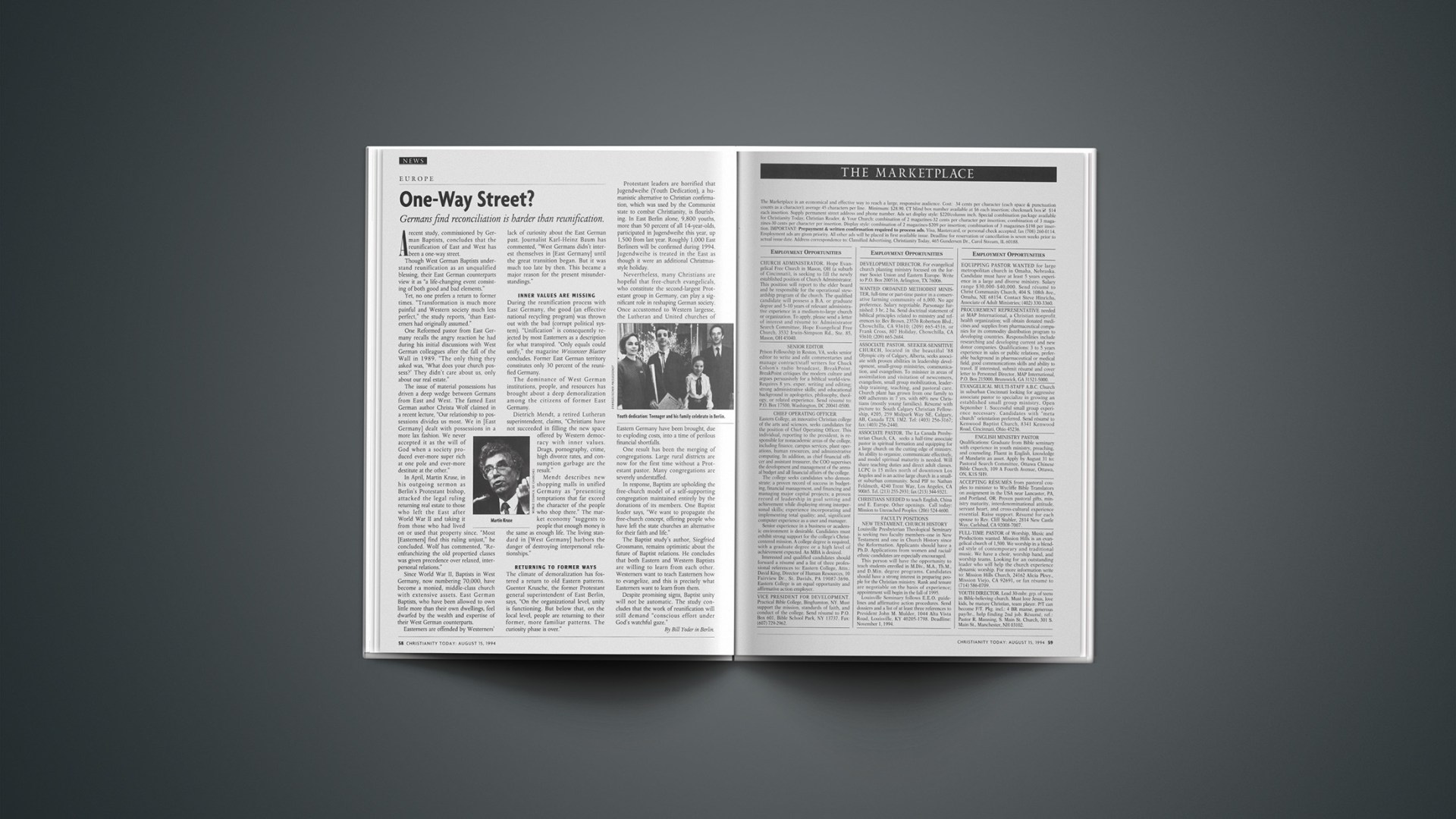Germans find reconciliation is harder than reunification.
A recent study, commissioned by German Baptists, concludes that the reunification of East and West has been a one-way street.
Though West German Baptists understand reunification as an unqualified blessing, their East German counterparts view it as “a life-changing event consisting of both good and bad elements.”
Yet, no one prefers a return to former times. “Transformation is much more painful and Western society much less perfect,” the study reports, “than Easterners had originally assumed.”
One Reformed pastor from East Germany recalls the angry reaction he had during his initial discussions with West German colleagues after the fall of the Wall in 1989. “The only thing they asked was, ‘What does your church possess?’ They didn’t care about us, only about our real estate.”
The issue of material possessions has driven a deep wedge between Germans from East and West. The famed East German author Christa Wolf claimed in a recent lecture, “Our relationship to possessions divides us most. We in [East Germany] dealt with possessions in a more lax fashion. We never accepted it as the will of God when a society produced ever-more super rich at one pole and ever-more destitute at the other.”
In April, Martin Kruse, in his outgoing sermon as Berlin’s Protestant bishop, attacked the legal ruling returning real estate to those who left the East after World War II and taking it from those who had lived on or used that property since. “Most [Easterners] find this ruling unjust,” he concluded. Wolf has commented, “Re-enfranchizing the old propertied classes was given precedence over relaxed, interpersonal relations.”
Since World War II, Baptists in West Germany, now numbering 70,000, have become a monied, middle-class church with extensive assets. East German Baptists, who have been allowed to own little more than their own dwellings, feel dwarfed by the wealth and expertise of their West German counterparts.
Easterners are offended by Westerners’ lack of curiosity about the East German past. Journalist Karl-Heinz Baum has commented, “West Germans didn’t interest themselves in [East Germany] until the great transition began. But it was much too late by then. This became a major reason for the present misunderstandings.”
INNER VALUES ARE MISSING
During the reunification process with East Germany, the good (an effective national recycling program) was thrown out with the bad (corrupt political system). “Unification” is consequently rejected by most Easterners as a description for what transpired. “Only equals could unify,” the magazine Weissenseer Blaetter concludes. Former East German territory constitutes only 30 percent of the reunified Germany.
The dominance of West German institutions, people, and resources has brought about a deep demoralization among the citizens of former East Germany.
Dietrich Mendt, a retired Lutheran superintendent, claims, “Christians have not succeeded in filling the new space offered by Western democracy with inner values. Drugs, pornography, crime, high divorce rates, and consumption garbage are the result.”
Mendt describes new shopping malls in unified Germany as “presenting temptations that far exceed the character of the people who shop there.” The market economy “suggests to people that enough money is the same as enough life. The living standard in [West Germany] harbors the danger of destroying interpersonal relationships.”
RETURNING TO FORMER WAYS
The climate of demoralization has fostered a return to old Eastern patterns. Guenter Krusche, the former Protestant general superintendent of East Berlin, says, “On the organizational level, unity is functioning. But below that, on the local level, people are returning to their former, more familiar patterns. The curiosity phase is over.”
Protestant leaders are horrified that Jugendweihe (Youth Dedication), a humanistic alternative to Christian confirmation, which was used by the Communist state to combat Christianity, is flourishing. In East Berlin alone, 9,800 youths, more than 50 percent of all 14-year-olds, participated in Jugendweihe this year, up 1,500 from last year. Roughly 1,000 East Berliners will be confirmed during 1994. Jugendweihe is treated in the East as though it were an additional Christmas-style holiday.
Nevertheless, many Christians are hopeful that free-church evangelicals, who constitute the second-largest Protestant group in Germany, can play a significant role in reshaping German society. Once accustomed to Western largesse, the Lutheran and United churches of Eastern Germany have been brought, due to exploding costs, into a time of perilous financial shortfalls.
One result has been the merging of congregations. Large rural districts are now for the first time without a Protestant pastor. Many congregations are severely understaffed.
In response, Baptists are upholding the free-church model of a self-supporting congregation maintained entirely by the donations of its members. One Baptist leader says, “We want to propagate the free-church concept, offering people who have left the state churches an alternative for their faith and life.”
The Baptist study’s author, Siegfried Grossmann, remains optimistic about the future of Baptist relations. He concludes that both Eastern and Western Baptists are willing to learn from each other. Westerners want to teach Easterners how to evangelize, and this is precisely what Easterners want to learn from them.
Despite promising signs, Baptist unity will not be automatic. The study concludes that the work of reunification will still demand “conscious effort under God’s watchful gaze.”
Copyright © 1994 Christianity Today. Click for reprint information.










